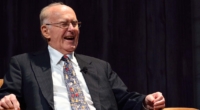Gordon Moore, co-founder of Intel Corp, passed away at the age of 94. Moore’s prediction that the number of transistors on microchips would double every year since the invention of integrated circuits helped push Intel and rival chipmakers to aggressively target research and development resources, allowing for the advent of personal computers, the internet, and Silicon Valley giants like Apple, Facebook, and Google. Moore’s legacy as a pioneer in the semiconductor industry will continue to shape technological progress for years to come. He was also a philanthropist who donated over $5 billion in Intel stock to his foundation, which focused on environmental causes. He received a Medal of Freedom, the nation’s highest civilian honor, from President George W. Bush in 2002.
Intel Co-Founder and Pioneer of the Semiconductor Industry, Gordon Moore, Passes Away at 94
Gordon Moore, the co-founder of Intel Corp and a pioneer in the semiconductor industry, has died at the age of 94. Intel and Moore’s family philanthropic foundation confirmed that he died at his home in Hawaii surrounded by family. Moore co-launched Intel in 1968 and was known as the rolled-up-sleeves engineer within a triumvirate of technology luminaries. He predicted a steady rise in computing power, known as “Moore’s Law,” which became a rule of thumb for the industry. Thanks to advancements in technology, the number of transistors on microchips had doubled every year since integrated circuits were invented, according to Moore. His prediction helped push Intel and rival chipmakers to target their research and development resources, allowing for the advent of personal computers, the internet, and Silicon Valley giants like Apple, Facebook, and Google. Moore’s foresight was evident in an article he wrote in 1965, two decades before the PC revolution and more than 40 years before Apple launched the iPhone. In it, he predicted that integrated circuits would lead to “home computers, automatic controls for automobiles, and personal portable communications equipment.”
Moore earned a Ph.D. in chemistry and physics in 1954 at the California Institute of Technology before going to work at the Shockley Semiconductor Laboratory, where he met future Intel co-founder Robert Noyce. Together, they departed in 1957 to launch Fairchild Semiconductor. In 1968, Moore and Noyce left Fairchild to start the memory chip company soon to be named Intel. Moore and Noyce’s first hire was another Fairchild colleague, Andy Grove, who would lead Intel through much of its explosive growth in the 1980s and 1990s. Although he predicted the PC movement, Moore did not buy a home computer until the late 1980s.
“It sure is nice to be at the right place at the right time,” Moore said in an interview around 2005. “I was very fortunate to get into the semiconductor industry in its infancy. And I had an opportunity to grow from the time where we couldn’t make a single silicon transistor to the time where we put 1.7 billion of them on one chip! It’s been a phenomenal ride.” Moore’s legacy as a pioneer in the semiconductor industry will continue to shape technological progress for years to come.
Gordon Moore: The Accidental Entrepreneur Who Revolutionized the Tech Industry
Gordon Moore, the co-founder of Intel Corp and a pioneer in the semiconductor industry, passed away at the age of 94. Described by Fortune magazine as an “accidental entrepreneur,” Moore was instrumental in the creation of the microprocessors that paved the way for the personal computer revolution. Together with Robert Noyce and Andy Grove, he formed a powerhouse partnership that helped put “Intel Inside” processors in over 80% of the world’s personal computers. Moore was known for his hands-on approach to engineering and spent countless hours refining Noyce’s ideas. His obvious talent inspired other engineers working for him, and he played a crucial role in making Moore’s Law a reality.
Moore was executive president of Intel until 1975 and later served as chairman and CEO from 1979 to 1987. He remained chairman until 1997. In addition to his contributions to the tech industry, Moore was also a philanthropist who donated over $5 billion in Intel stock to his foundation, which focused on environmental causes. He also gave hundreds of millions to his alma mater, the California Institute of Technology, and backed the Search for Extraterrestrial Intelligence project, known as SETI. Moore received a Medal of Freedom, the nation’s highest civilian honor, from President George W. Bush in 2002.
Moore’s legacy as a pioneer in the semiconductor industry will continue to shape technological progress for years to come. His accidental journey to becoming an entrepreneur is a testament to the power of hard work, dedication, and a little bit of luck.
Don’t miss interesting posts on Famousbio










